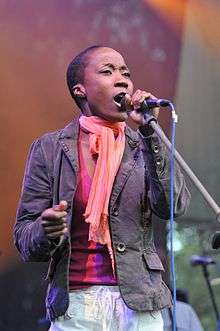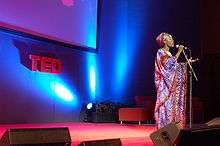Rokia Traoré
Rokia Traoré (born January 26, 1974) is a Malian-born singer, songwriter and guitarist.[1]
Rokia Traoré | |
|---|---|
 Traoré at INmusic festival in 2009. | |
| Background information | |
| Born | January 26, 1974 |
| Origin | Kolokani, Mali |
| Genres | World music, Electroacoustic, Afro-beat, Folk |
| Occupation(s) | Singer, songwriter, guitarist |
| Years active | 1997–present |
| Website | www |
She made six albums between 1998 and 2016. Bowmboï (2003) won the Critics Award category at the BBC Radio 3 Awards for World Music in 2004[2] and Tchamantché (2008) won Victoires de la Musique World Music Album of the Year in 2009. Traoré won Best Artist in the Songlines Music Awards in 2009.[3]
She is a member of the Bambara ethnic group.
Biography
Traoré's father was a diplomat and she travelled widely in her youth. She visited Algeria, Saudi Arabia, France and Belgium and was exposed to a wide variety of influences. Her hometown of Kolokani is in the northwestern part of Mali's Koulikoro region.
While the Bambara have a tradition of griot performing at weddings, members of the nobility, such as Rokia, are discouraged from performing as musicians. Rokia attended lycée in Mali while her father was stationed in Brussels and started performing publicly as a university student in Bamako. She plays acoustic guitar as well as sings, and uses vocal harmonies in her arrangements which are rare in Malian music. She also plays ngoni (lute) and balafon.
In 1997 Traoré linked with Mali musician Ali Farka Touré which raised her profile.
She was selected to be on the jury for the main competition section of the 2015 Cannes Film Festival.[4][5]
Recordings
Her first album Mouneïssa (Label Bleu), released in late 1997 in Mali and September 1, 1998 in Europe, was acclaimed for its fresh treatment and unqualifiable combinations of several Malian music traditions such as her use of the ngoni and the balafon. It sold over 40,000 copies in Europe.
On July 11, 2000, her second album Wanita was released. Traoré wrote and arranged the entire album.
Her 2003 album Bowmboï has two tracks recorded with the Kronos Quartet but still sung in the Bamana language.
Her album Tchamantché was released on May 6, 2008, followed in 2013 by her album Beautiful Africa.
She wrote the music for the 2011 Toni Morrison play Desdemona.[6]
Performances

She played at WOMAD in 2004 and completed her first tour of North America in the same year.[7]
In March 2005 she performed at the "Africa Live" festival, held in Dakar, Senegal.
Also in 2005 she performed at the Youssou N'dour and Friends concert in Geneva.
In December 2006 Peter Sellars' New Crowned Hope festival, which is part of the City of Vienna's celebrations commemorating Wolfgang Amadeus Mozart's birthday 250 years ago, saw the world premiere of Wati, a performance by Rokia Traoré and the Klangforum Wien.
In 2011 she performed at Paolo Fresu's Time in jazz festival in Berchidda.[8]
In September 2012, she was included in the campaign "30 Songs / 30 Days" to support Half the Sky: Turning Oppression into Opportunity for Women Worldwide, a multi-platform media project inspired by Nicholas Kristof and Sheryl WuDunn’s book.[9]
In 2013, she performed at Glastonbury Festival.
Awards
- 1997: Radio France Internationale prize, "African Discovery" of 1997.
- 2000: One of The New York Times' critics nominated Wanita for album of the year.
- 2004: Winner, BBC Radio 3 Awards for World Music, Critics Award category for Bowmboï[2]
- 2004: Runner-up, BBC Radio 3 Awards for World Music, Africa category[10]
- 2005: Runner-up, BBC Radio 3 Awards for World Music, Africa category[11]
- 2009: Victoires de la Musique World Music Album of the Year for Tchamantché
- 2009: Winner, Best Artist category, Songlines Music Awards[3][12]
Discography
| Year | Album | Peak positions | ||
|---|---|---|---|---|
| BEL (Fl) |
BEL (Wa) |
FR [13] | ||
| 1998 | Mouneïssa | – | – | – |
| 2000 | Wanita | – | – | – |
| 2003 | Bowmboï | – | – | 43 |
| 2008 | Tchamantché | 76 | 63 | 35 |
| 2013 | Beautiful Africa | 86 | 120 | 66 |
| 2016 | Né So | 49 | 139 | 77 |
References
- https://www.lemonde.fr/afrique/article/2020/03/14/mobilisation-en-faveur-de-la-chanteuse-malienne-rokia-traore-incarceree-en-france_6033104_3212.html
- "Awards for World Music 2004: Critics Award". BBC Radio 3. Accessed 22 October 2017
- "Songlines Music Awards Winner 2009". Songlines (magazine). Accessed 22 October 2017
- "The Jury of the 68th Cannes Film Festival". Cannes Film Festival. Retrieved 21 April 2015.
- "Jake Gyllenhaal, Sienna Miller and Guillermo del Toro Join Cannes Film Festival Jury". The Wrap. Retrieved 21 April 2015.
- von Uthmann, Jorg (19 October 2011). "Desdemona Gets Even in Morrison-Sellars Othello Remix: Review". Retrieved 2011-10-23.
- "Womad". BBC Radio 3. Accessed 22 October 2017
- Time in Jazz, Calendario 2011.
- "30 Songs / 30 Days for Half the Sky". Half the Sky Movement. Archived from the original on 2012-10-14. Retrieved 2017-03-09.
- "Awards for World Music 2004: Winners & Nominees". BBC Radio 3. Accessed 22 October 2017
- "BBC World Music 2005 Award"
- "Songlines Music Awards 2009 Winner". Songlines (magazine). Accessed 22 October 2017
- "Rokia Traoré Discography". lescharts.com. Hung Medien. Retrieved 14 April 2012.
Further reading
- Rough Guides, World Music the Rough Guide: Volume 1 Africa Europe and the Middle East, Second Edition. London. 2000. Page 560
External links
| Wikimedia Commons has media related to Rokia Traoré. |